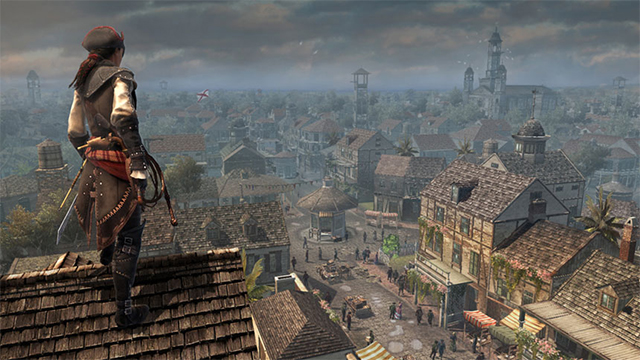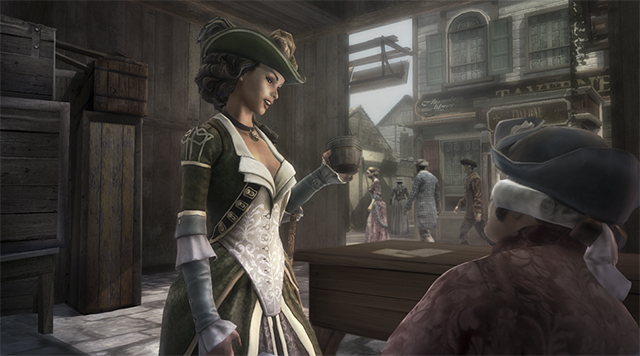Bugs in the bog
A few ugly bugs marred my murderous adventures, the most annoying being a bizarre camera error. After a cutscene, the frame would violently shake every couple of seconds. This went on for a good 20 minutes. Thankfully, another cinematic fixed the camera before I decorated my Vita with my last lunch.
The New Orleans crowds suffer a few problems, most notably random disappearances. Sometimes you’ll see a citizen chaotically change forms, shapeshifting through multiple character models.
I also suffered one game-crashing bug, and at one point the sound cut out entirely for a few seconds. These problems pop up frequently enough to make the experience feel cheaper than what you’re used to from Assassin’s Creed releases.
Lame Vita gimmicks
Did you hear!? The Vita has a touchscreen! Two of them! And gyroscope controls! And a camera! Don’t worry, if you ever forget about the Vita’s numerous features, Liberation will happily remind you through a series of lame gimmicks and minigames.
I groaned when I had to open a letter by swiping my fingers on the top of the front and back touchscreens. I just laughed when I did it for the fifth time. During canoeing sequences, you can row your boat either by pressing a button or by swiping down on the back of the system. Guess which option I chose.
A lot of these gimmicks are downright broken. On certain occasions, you have to hold your Vita up to a bright light to reveal a secret map. I placed my system over a shining light bulb to no avail, but somehow pointing the screen toward the floor worked. One minigame involved tilting the Vita to move a little ball around a maze, but I had no idea where the center of gravity was. I just haphazardly overcompensated until the stupid ball went into the stupid hole.
My “favorite” was the out-of-nowhere touchscreen dancing minigame. You really just have to laugh.
Just not enough
So much is missing from Liberation that you would expect from a real Assassin’s Creed game. Simple organic interactions with crowds, like beggars pestering you for money or encountering an oppressed citizen in need of rescue, are gone. The city of New Orleans, while nicely detailed, can’t compare to the scope of Constantinople from Assassin’s Creed: Revelations or Rome from Assassin’s Creed: Brotherhood. Liberation’s Big Easy just doesn’t feel alive like those cities do.
This is also a far shorter adventure than the ones presented by its console predecessors, with few side quests around to help pad the experience. I’m OK with a short game if it’s properly paced, but Liberation often feels like entire chunks just went missing. One time, a cutscene ended, and I suddenly had to fight an alligator for no reason. It felt like someone just forgot to put in a transition.

The actual story also feels like its lacking something, with no real consistent plot or villain to tie the decade-spanning adventure together. Additionally, you don’t get to play as Desmond, a reoccurring character in the series whose modern-day exploits usually help bridge the franchise’s entries together. His scenes also used to offer a nice break from the historical scenarios.
Typically in an Assassin’s Creed game, Templars or Assassins (two ancient groups constantly warring with each other) use a mind-reading machine on Desmond, so he can relive experiences from his ancestors. However, Aveline is not related to Desmond, so I understand why he’s not around for Liberation. But Ubisoft Sofia should have realized that it needed something to help tie this game together with previous installments. And I mean more than a lame cameo from Assassin’s Creed III’s hero, Connor.
Even if you’re unfamiliar with the series, you’ll have a hard time shaking the feeling that you’re playing an incomplete game. Just because the experience is on a smaller system doesn’t mean that the actual scope should feel smaller as well. Uncharted: Golden Abyss, another Vita game spun off from a popular console counterpart, is essentially another Uncharted game. Liberation is not just another Assassin’s Creed game. It’s less than that.
Conclusion
The core of the Assassin’s Creed experience is here, but that’s the problem. It’s just the core. Liberation is missing too many of the essential series ingredients, resulting in a game that’s often more annoying than fun to play.
But you will find moments in Liberation where the Assassin’s Creed flavor tastes as strong as you could hope for, like when you’re running through the trees of the bayou or silently taking down a fort’s defenses. Sadly, the game is quick to water these moments down with a lame quest, silly touchscreen minigame, or some distracting bug.
Liberation feels like an unimportant side story in a far more ambitious tale, one that you don’t really need to hear. If you’ve never played an Assassin’s Creed game before, then this is a terrible place to start.
Score: 55/100
Assassin’s Creed III: Liberation releases for the PlayStation Vita on Oct. 30. The publisher provided GamesBeat with a digital copy of the game for the purpose of this review.
VentureBeat's mission is to be a digital town square for technical decision-makers to gain knowledge about transformative enterprise technology and transact. Learn More


